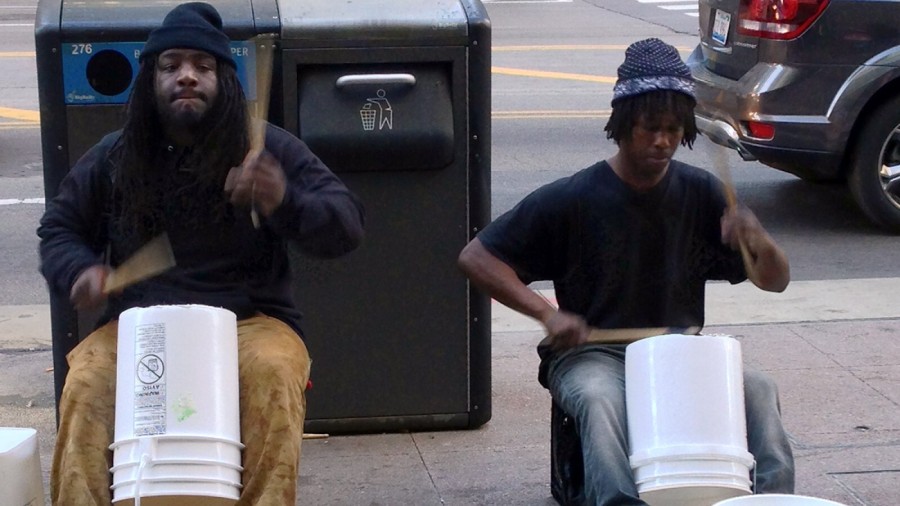Signs Urging Residents To Call The Police On Chicago’s Bucket Boys Spark Outrage
By Natalie Moore

Signs Urging Residents To Call The Police On Chicago’s Bucket Boys Spark Outrage
By Natalie MooreIt started with Twitter.
Writer and teacher Aurelius Raines casually scrolled his feed and saw a picture of a flyer taped to a lamp post in Chicago’s Streeterville neighborhood.
It said: “Do you dislike hearing ‘bucket banger’ noise in your home? Help your neighbors. Call 911 and report.”
If y’all see these take them down…tryna call cpd on the youth pic.twitter.com/E7ROintizT
— Doctor of Streetwear ⵣ (@__YanYe__) January 22, 2021
His friend poet Tara Betts saw it, too, and responded.
“I was really surprised how many people responded to the singular tweet of saying we should tear them down. And then I started texting Aurelius — did you see this?” Betts said.
“Bucket bangers” pejoratively refers to bucket boys in Chicago. These street musicians are a local institution who use drumsticks to play on 5-gallon buckets for tips. The bucket boys originated from the Robert Taylor Homes, a demolished public housing development, back in the 1990s. They can be seen at intersections along the Dan Ryan, near the Art Institute and numerous other spots around Chicago, a continual new generation of youth bringing vibrancy to a big city. But the young Black male musicians sometimes face opposition to their music from downtown residents.
Raines ended up going by himself to Streeterville last weekend, and he didn’t see any bucket boys playing. He threw two flyers away and put one in his back pocket. Then Raines recorded himself on the corner of Michigan and Chicago avenues expressing his dismay.
“This is not OK,” Raines said. “This right here is just violence against Black people.”

Yanis Mokraoui, who posted the original tweet seen by Raines and Betts, said he’s happy to see the responses.
“It really showed me how interconnected we all are regardless of the side of the city we reside in. Chicago cares about the youth, and we will not allow them to be hurt or criminalized,” Mokraoui said. “These kids are trying to make some pocket money and non-Chicagoans are getting upset it’s loud in the city. The bucket boys are a Chicago staple, and I hope after seeing the support from the city that they beat their drums a little louder.”
Bucket boys are as much a part of the city as the summertime Taste of Chicago. The drummers aren’t formally trained but exude creativity and hustle with their rhythmic flourishes and spinning sticks.
Over the years, downtown buildings have circulated petitions to stop bucket boys from playing. The signs up in Streeterville don’t have a name attached. The area neighborhood association says they don’t know who’s behind them.
“If I got outraged every time white America treated bucket boys like n******, I’d be mad all the time. So I try not to overemotionalize things,” said Merci Carmichael, manager of a group of performers who call themselves Chicago Bucket Boys.
Carmichael said they frequently get the police called on them — even if they have a permit.
“They’re not arrested all the time, but they are fined, given tickets, which is a financial prison within itself,” Carmichael said. “I manage a small group. We travel to Mexico City, Nigeria — every place is fine but here.”
Downtown aldermen have said they field numerous calls from constituents complaining about the constant noise. Ald. Brian Hopkins, 2nd Ward, points to a 2012 city ordinance that bans all street performances on Michigan Avenue between Superior Street and Delaware Place — a strip along the Magnificent Mile where the flyers were posted. Hopkins said it would be within residents’ rights to call the police if that ordinance is violated.
But it’s the decision to call police in response to such non-threatening situations that strikes a chord for many Black folks who view those moments as a reflection of unreasonable fears of Black people. Those situations also carry an ominous tone for Black Americans who know how interactions with police can sometimes end in tragedy.
Betts said the flyers are violent toward young people.
“It speaks to a larger problem on how the city has turned its back on young Black people for a long time,” said Betts, founder of the Whirlwind Center, an arts nonprofit. “It’s tone deaf on policing, racism, arts education.”
She also thinks about how sound is racialized not just here, but around the country. New white neighbors complained about go-go music, a Black art form, played in front of a cellular phone store in Washington, D.C. As Harlem gentrified, complaints ramped up about drummers playing in Marcus Garvey Park on Saturdays.
“We have to think about the why,” Betts said.
The “why” in Chicago is that even after last summer’s racial reckoning of racism and police violence after the murder of George Floyd, someone would post a sign telling people to call the police on a group of Black boys because their drumming is considered a nuisance.
Natalie Moore is a reporter on WBEZ’s Race, Class and Communities desk. You can follow her on Twitter at @natalieymoore.
